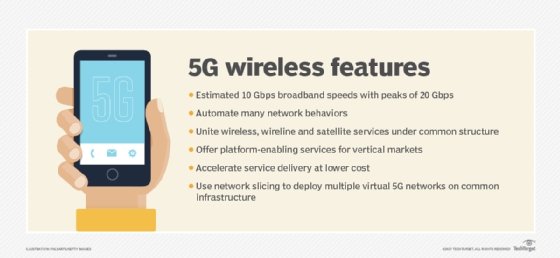What is 5G?
Fifth-generation wireless or 5G is a global standard and technology for wireless and telecommunications networks. It uses radio waves to transmit data, just like the previous wireless standards 3G, 4G and 4G Long-Term Evolution (LTE). Compared to its predecessors, 5G offers significant improvements in bandwidth, speed and latency.
Engineered to operate on higher frequencies, 5G significantly enhances the speed and bandwidth of wireless networks while reducing latency compared to older wireless networks. 5G is also more reliable and offers stronger connectivity compared to earlier standards.
These advances are crucial for addressing the growing demand for internet access worldwide. In early 2025, 67.9% of the global population used the internet, according to the Digital 2025: Global Overview Report by research organization DataReportal. That's 5.56 billion internet users out of a global population of 8.2 billion – an increase of 136 billion people compared with 2024.
5G is also critical to support the growing amount of data being created worldwide. Per research and trend analysis firm Exploding Topics, this figure has increased by a staggering 74 times from just 2 zettabytes (ZB) in 2010 to 120 ZB in 2023. Moreover, the upward growth trajectory is expected to continue. For example, 181 ZB of data is expected to be created in 2025. This represents a massive 150% increase over the amount created just two years prior.
The network infrastructure of previous wireless networks cannot handle these data volumes. 5G uses infrastructure that offers much higher data capacity and can handle large amounts of data. The higher bandwidth, upload and download speeds, and lower latency of 5G make it better suited than older networks for newer technologies like AI, machine learning (ML) and smart devices, including smartphones, smart speakers, smart home appliances and wearables.
Currently, 5G is ideal for telecommunications, video streaming, internet of things (IoT) and industrial IoT (IIoT), and for private networks using private 5G. It currently supports applications such as self-driving cars, traffic management, smart utilities and supply chain management.
How does 5G work?
As with 3G and 4G networks, 5G wireless networks are composed of cell sites divided into sectors that send data through radio waves. Essentially, cells refer to the smaller, geographical sections that collectively form a 5G service area. 5G devices within a cell use radio waves to connect to the phone network and the internet.

Core components of 5G
A base station and antennae facilitate connections over 5G networks. Other core components of 5G include the following:
- 5G New Radio (5G NR), which defines the frequency spectrum or bands, in the Sub-7 gigahertz (GHz) range and frequency bands above 24 GHz over which devices connect to the internet to send and receive data.
- 5G Next Generation Core, the element that uses a service-based architecture to facilitate control and management of the 5G network and devices connected to it.
- Multi-access edge computing, which enables the low latency and bandwidth efficiency capabilities of 5G.
- IP Multimedia Subsystem, which enables the delivery of Internet Protocol-based, rich multimedia services over 5G.
A 5G NR air interface design, which acts as a specification for 5G networks, enables 5G. It describes how 5G products transmit data with 5G NR network infrastructure. 5G uses orthogonal frequency-division multiple access (OFDMA), the same radio access technology that 4G LTE networks use. In this way, 4G LTE wireless technology is foundational for 5G. Techniques such as quadrature amplitude modulation, beamforming, and other advanced features also help 5G enhance network efficiency and reduce latency.
What is the 5G spectrum?
The 5G spectrum is divided into millimeter wave (mmWaves) high-band and Sub-6 5G low- and mid-bands. Low-band frequencies are the slowest of 5G speeds but are still faster than some 4G LTE speeds. Mid-band, by comparison, is faster than low-band, but is still eclipsed by mmWave. Sub-6 5G reaches greater distances than mmWave, but has lower speed and capacity compared to mmWave. Although Sub-6 5G is slower than mmWave, it is typically still faster than average 4G LTE speeds.
In densely populated areas, mmWave remains in use, while Sub-6 frequencies can be used in less dense areas. The lower-end frequencies can travel up to hundreds of square miles. This means that implementing all 5G frequency bands provides comprehensive coverage and the fastest speeds in the most heavily trafficked areas.
The importance of mmWave spectrum in 5G
Unlike 4G, which requires large, high-power cell towers to radiate signals over longer distances, 5G wireless signals travel through many small cell stations, such as those located on light poles or building roofs. The use of multiple small cells is necessary, as the mmWave spectrum -- the band 5G relies on to generate high speeds -- can only travel over short distances and is subject to interference from weather and physical obstacles.
Trees, walls and buildings can easily block mmWave frequencies. Often, mmWave can only cover about a city block within the direct line of sight of a cell site or node. Different workarounds have been tried. A brute-force approach involves using multiple nodes around each block of a populated area so a 5G-enabled device can use an air interface -- switching from node to node while maintaining mmWave speeds. Another, more feasible, way of offsetting the challenges relating to distance and interference with mmWave is using it in conjunction with a lower frequency wireless spectrum -- called Sub-6 5G. The Sub-6 5G spectrum is superior to mmWave in terms of distance supported, but inferior in terms of speed and capacity.
How fast is 5G?
With 5G, data transmitted over wireless broadband connections can travel at multigigabit speeds, with potential ideal peak download speeds as high as 20 gigabits per second (Gbps). These speeds surpass wireline network speeds and can offer latency of under 5 milliseconds (ms), which is beneficial for applications that require real-time feedback or uninterrupted internet connectivity. 5G enables a sharp increase in the amount of data transmitted over wireless systems due to more available bandwidth and advanced antenna technology.
Each band in the 5G spectrum operates at different speeds:
- Low bands provide speeds less than 1 GHz, but are still faster than some 4G LTE speeds.
- Mid-band provides speeds from 3.4 GHz to 6 GHz.
- The mmWave band is 30 GHz to 300 GHz.
Each band's speed varies depending on factors such as the carrier, distance, amount of traffic on the network, or obstacles in the case of mmWaves.

What are the benefits of 5G?
5G offers compelling benefits over older networks, including the following:
- Supports more applications using higher frequencies and higher bandwidth.
- Provides enhanced mobile broadband coverage and connectivity.
- Offers significantly lower latency and faster speeds for uploads and downloads.
- Supports new technology options such as 4K streaming or near-real-time streaming of virtual reality (VR).
- Provides more accurate data transmissions due to lower block error rates.
Since 5G operates on a wider bandwidth range, it offers higher capacity and throughput. The expanded bandwidth range enables more devices to connect to a single 5G network and send and receive data simultaneously without appreciable degradation in data transmission speed or accuracy. The fast speeds and lower latency of 5G mean it can handle the more rigorous connectivity and data requirements of new technologies and devices.
What are the drawbacks of 5G?
A downside of 5G is its limited coverage and range. Higher-frequency mmWaves can be easily blocked, so reliable operation depends on direct line-of-sight connections. This problem can significantly decrease signal strength and cause communication interruptions. Providers can mitigate this with directional antennas and dense base station networks.
5G networks can also be jammed in the mmWave frequency band. Malicious actors can use high-gain directional antennae to aim powerful jamming signals that prevent the intended receiver from receiving the transmitted signal. Some cyber attackers also use opportunistic wiretapping and jamming to cause severe network degradation and service interruptions based on specific conditions.
The development of AI-based attack tools also enables sophisticated threat actors to execute high-volume, advanced swarm attacks against 5G networks and devices. A few sophisticated attackers also use IoT and IIoT networks and application programming interfaces to manipulate 5G networks, execute distributed denial-of-service and ransomware attacks, and evade detection by traditional security tools.
Privacy concerns are another issue. 5G networks use cloud-based data storage. However, operators cannot always protect user data stored in the cloud. Many might not even try to if they operate in countries with less stringent data privacy regulations. This can seriously endanger user privacy and lead to issues like identity theft, harassment or extortion.
Threat actors can potentially use user location information – discoverable on 5G networks -- in malicious ways to target or harm specific users. They can seize the International Mobile Subscriber Identity of a subscriber's device to monitor or eavesdrop on that person’s call activity.
Deploying 5G requires significant technical and financial resources. In some countries, operators may not have access to these resources, so their users cannot fully benefit from 5G connectivity in terms of speed, latency and reliability. Even in countries where 5G is becoming the norm, there can be an implementation divide between urban and rural areas. Urban areas tend to have higher internet and mobile penetration, resulting in faster 5G deployment compared to rural areas. Consequently, rural users might not benefit from 5G at the same pace as their urban counterparts.
The launch of 5G
Cellular companies in South Korea began deploying 5G networks in 2019 as the successor to 4G, making the Asian country the first to offer 5G to its cellphone users. Around the same time, the first 5G-compliant smartphones and associated devices began to become commercially available.
Initially, carrier 5G deployments were underwhelming, as some companies opted to expand their low-band infrastructure first. Although still 5G, it was not providing the blinding speed many carriers advertised -- as that would come with the emergence of mmWave spectrums. In the U.S., Verizon was a market leader in building its 5G mmWave architecture, rolling out its 5G network in 2019.
Since 2019, many carriers in the U.S. and elsewhere have expanded their 5G Sub-6 and mmWave deployments. After Verizon, Sprint, AT&T and T-Mobile started rolling out expansive 5G networks. Today, many carriers offer coverage maps on their websites, showing where they provide 5G mmWave, Sub-6 or 4G coverage. Most carriers offer different plans for each band, with varying price points. For example, Verizon's fastest 5G plan, Unlimited Ultimate, offers 5G Ultra Wideband with enhanced video calling and streaming capabilities. The next fastest plan is also for 5G Ultra Wideband, albeit with fewer features than the fastest plan. Both plans are four times faster than the regular 5G plan.
What types of 5G wireless services are available?
Network operators offer the following types of 5G services:
- 5G cellular services provide user access to operators' 5G cellular networks. The first services were rolled out in 2019. Cellular service delivery is also dependent upon the completion of mobile core standards by the 3rd Generation Partnership Project (3GPP).
- Private 5G delivers 5G cellular connectivity for private network use cases. An organization must own or rent 5G spectrum and infrastructure to enact a private 5G network. Private 5G networks function similarly to public 5G networks, but owners can provide restricted access to their own network. Private 5G networks can be deployed as either a service, wholly owned, hybrid or sliced private networks.
- 5G fixed wireless broadband services deliver internet access to homes and businesses without a wired connection to the premises. To achieve this, network operators deploy New Radio in small cell sites near buildings to beam a signal to a receiver on a rooftop or windowsill, which is then amplified within the premises. Fixed broadband services lower operator costs by eliminating the need to roll out fiber optic lines to every residence. Instead, operators need only install fiber optics to cell sites, and customers receive broadband services through wireless modems in their residences or businesses.
In the U.S., all major telecom providers provide 5G wireless broadband services for consumer and business use. Users can select from multiple plans, tailored to their specific connectivity requirements and budget. Higher-speed plans with more reliable coverage, router upgrades and other features cost more than lower-speed plans. But even with a lower-speed plan, 5G services are usually faster and more reliable than 4G and older networks.
5G vs. 4G: Key differences
Each generation of cellular technology differs in its data transmission speed and encoding methods, which require end users to upgrade their hardware. 4G can support up to 2 Gbps -- although peak speeds can also go down to 1 Gbps -- and is continuing to improve in speed. 4G offers speeds up to 500 times faster than 3G. 5G can be up to 100 times faster than 4G.
Latency is a key differentiator between 4G and 5G, with 5G offering superior performance. 5G uses OFDMA encoding, like 4G LTE. 4G, however, uses 20 MHz channels bonded together at 160 MHz. 5G uses a wider range of frequencies and can have channels between 100 and 800 MHz, which require larger blocks of airwaves than 4G.
The bandwidth range also distinguishes 5G from predecessor networks. Unlike older networks that operated in the Sub-3 GHz range, 5G expands its radio spectrum resources to 100 GHz and greater.
Another difference between 5G and 4G is smaller transmitters. With 5G, these devices consume less power, and more transmitters can be placed in various locations – such as the top of a building – to divide a service area into smaller cells. These cells act as base stations, connecting users within those cells to the 5G network. In contrast, 4G uses larger cells that require more power but still underperform 5G.
Network Block Error Rate (BER) is another area where 5G shines. 5G BER, a measure of data transmission quality, is very low -- near zero -- compared to 3G and 4G. That's because 5G uses adaptive Modulation and Coding Scheme (MCS) in which the transmitter automatically lowers the transmission speed when the error rate increases to a specific level. Very high real-time transmission accuracy is secured in exchange for a small drop in transmission speed.
Is 5G a replacement for 4G?
The answer is: not yet. Although 5G service is now widely available almost everywhere, it's not a full replacement for 4G as many expected. While there are areas today with fast multi-gigabit download speeds, most users will still encounter mid- or low-band 5G speeds. Even in a city block that provides mmWave 5G, frequencies can be blocked by obstacles, which means 5G speed will diminish if the signal must travel through, say, a wall. Because of this, users might notice only a minor speed improvement compared to 4G. 5G speeds are still considered fast in most cases, facilitating use cases such as wirelessly streaming videos in 4K resolutions.
5G use cases
5G supports a wide range of use cases, ranging from business and enterprise use to more casual consumer use. Some examples include:
- Streaming high-quality video.
- Seamless, low-cost, highly scalable communication among devices in an IoT environment.
- More accurate location tracking.
- Fixed wireless services.
- Low-latency mobile communication.
- Improved real-time business analytics.
- Immersive experiences with VR and augmented reality.
- Reliable and real-time remote control of critical infrastructure.
- Real-time information-sharing among healthcare professionals.
- Real-time patient monitoring through IoT-connected devices.
- Seamless connectivity between devices for traffic management, environmental management and city planning.
- Monitoring of carbon emissions and other pollutants aligned to environmental, social and governance and sustainability goals.
- Creation of industrial ecosystems with reliable closed-loop process automation and predictive maintenance.
In addition to improvements in speed, capacity and latency, 5G offers network management features such as network slicing, which enables mobile operators to create multiple virtual networks in a single 5G network. This enables wireless network connections to support specific uses or business cases and could be sold on an as-a-service basis. A self-driving car, for example, could require a network slice that offers extremely fast, low-latency connections so a vehicle could navigate in real time. A home appliance could be connected using a lower-power, slower connection because high performance is not crucial. IoT could use secure, data-only connections.
Business benefits of 5G
5G's value chain and its support of a broad range of industries have led to a notable effect on the global tech and business landscape and on national economies. By the end of 2025, global 5G population coverage is expected to reach 60%, according to a report by Ericsson. By 2031, global 5G coverage -- outside Mainland China -- is expected to increase to 85%. In North America, both the popularity and coverage of 5G are increasing. At the end of 2024, service providers had deployed 5G across low-, mid- and high-band frequencies. While mid-band coverage reached 90%, total coverage reached 95%, showing that 5G coverage is increasing rapidly and could eventually eclipse 4G coverage.
A PwC study forecasts that 5G will contribute $484 billion to the U.S. economy by 2030. In industrial manufacturing alone, 5G is expected to add $15 billion to the U.S. economy by 2030. On a global scale, the report predicts that the total effect of 5G on global GDP will reach $1.3 trillion. According to PwC, the five areas where 5G will have the most influence include the following:
- Healthcare: $530 billion
- Smart utilities: $330 billion
- Consumer and media applications: $254 billion
- Industrial manufacturing: $134 billion
- Financial services: $85 billion
Who is working on 5G?
Many of the major carriers, including AT&T, T-Mobile, and Verizon, are working to expand their 5G networks. These carriers generally support a multi-tier 5G strategy that encompasses low-band, mid-band, and mmWave frequencies.
The 3GPP is updating its 5G specifications. In June 2025, it released 5G Advanced Release 20 (Rel-20 5G-Advanced). This is the sixth technology standard release for 5G Advanced. It includes numerous enhancements to 5G use cases and deployments, laying the foundation for the future 6G wireless standard.
Why 5GE is not really 5G
Early in its 5G development, AT&T introduced a 5G Evolution network, where 4G LTE users received an update that purportedly upgraded them to 5GE. 5GE was just a rebranding of AT&T's Gb 4G LTE network, however. In this sense, it is not true 5G.
AT&T argued that the speeds offered with 5GE were sufficiently close to those of 5G. Even so, it still was not technically 5G. It does not align with the 5G cellular standard defined by the 3GPP and does not offer the same high speeds and low latency as 5G. The G in these terms typically stands for generation, indicating a compatibility break with previous hardware. Simply put, 5GE is an iteration of and an improvement over 4G LTE, rather than an upgrade to 5G. Users would not have been able to update their phones to support 5G; rather, they would have needed to get a new phone that supports 5G. This was a marketing strategy that misled individuals who did not know the specifics behind the technology.
What 5G phones are available?
A phone or another piece of hardware cannot simply receive a software update on a 4G phone to enable 5G. 5G requires specific hardware. To use 5G, a user must have a device that supports 5G, a carrier that supports 5G, and be within range of a 5G node. Additionally, the mobile provider should offer 5G plans, and users must sign up for a suitable plan.
Most new phones support 5G, and all major cellphone manufacturers now offer 5G-enabled phones. Yet devices are available that are not 5G-enabled. They are older models or budget phones that lack the necessary hardware, including 5G modems to connect to 5G networks.
5G vs. 6G
The sixth generation of cellular technology, or 6G, is expected to provide even faster speeds, even lower latency -- to the tune of microseconds -- and even better connectivity than 5G. Additionally, 6G is likely to operate at higher radio frequencies, enabling it to carry more data and provide greater bandwidth than 5G.
6G is also expected to have built-in AI and ML capabilities. This will expand 5G's existing wireless communication infrastructure and support even more high-end applications where issues like buffering and lag are unacceptable. Some experts also predict that 6G will help scale up machine-to-machine communication, such as the communication that occurs within IoT and IIoT networks.
As of 2025, research and development into 6G is progressing at a steady pace, with telecom providers, device manufacturers, universities and governments all working to develop technologies and hardware that can support 6G networks. However, 6G is not yet publicly available. Some researchers and industry watchers predict deployment between 2028 and 2030.
History of cellular wireless technology
Nippon Telegraph and Telephone launched 1G in 1979. By 1984, Japan became the first country to have a nationwide generational network. Motorola introduced the first commercially available cellphone in 1983, called the DynaTAC.
The second generational network, 2G, emerged in Finland in 1991. It provided significant improvements to mobile talk, such as enhanced sound quality and reduced static, and introduced encrypted calls. Another major 2G addition was the ability to access media on cell phones by enabling the transfer of data bits.
3G wireless debuted in 2001. It focused on standardizing network protocols from different vendors. The biggest improvement was its increased speed, which enabled users to browse the internet on their mobile devices. 3G had four times the data transferring capability compared to 2G. International roaming services were introduced.
4G surfaced in 2009. Users could stream high-quality video with faster mobile web access. In 2011, LTE networks began launching in Canada. 4G LTE remains common in areas where 5G is not yet available.
The 3GPP began its work on 5G in 2015. Its focus was to develop globally applicable specifications for 3G mobile systems. The 3GPP meets four times annually to plan and develop new releases. Each release builds upon the previous one, providing new, standardized functionalities.
In 2017, the fifth 5G and 5G NR specifications were released. It was a new radio access technology developed by the 3GPP for use on 5G mobile networks. In 2018, the 3GPP approved Release 16, which included several specifications, including network slicing.
In 2019, Verizon was among the first carriers to develop a 5G mobile network in two U.S cities: Chicago and Minneapolis. Other carriers in the U.S., such as Sprint, AT&T, and T-Mobile, began launching their own 5G infrastructure and services around the same time. Some companies started focusing on higher-speed mmWave infrastructure, while others decided to invest in developing lower-band frequencies first.
In 2020, 3GPP Release 16 was published, covering applications of 5G such as automotive and IIoT. Release 18, launched in 2022, covered system architecture and services, security, multimedia codecs, management orchestration and charging features.
In 2025, 3GPP released 5G Advanced Release 20, designed to enhance the current capabilities of 5G with critical upgrades to service requirements, system architecture and protocol details. All service requirements were frozen in June 2025. 3GPP expects to complete 80% of the system architecture aspects of Rel-20 5G-Advanced by June 2026, with all aspects to be frozen by September. The 5G protocol details are planned for completion in March 2027, with the final ASN.1/OpenAPI freeze planned for June 2027.
As 5G adoption evolves, we will see new iterations, updates and improvements. Learn more about 5G adoption and how different industries will benefit from it.







